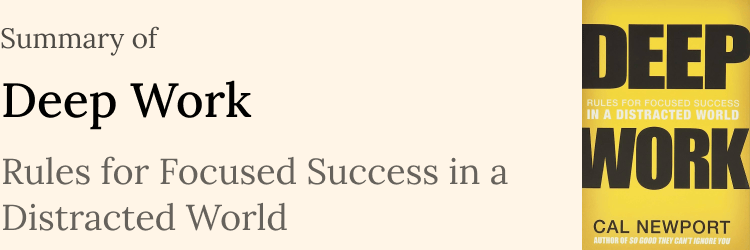- Playtext
- Posts
- Deep Work
Deep Work
Rules for Focused Success in a Distracted World
Deep Work: Rules for Focused Success in a Distracted World
Deep Work explores the concept of deep work and its profound impact on productivity, creativity, and fulfillment in the modern world. It champions the value of concentrated, distraction-free work and argues that this level of focus is crucial for maximizing productivity and achieving success. Focusing on tasks creates better work more efficiently, develops a stronger grasp of complex information, and produces substantial professional output.
Key Principles
1. Deep Work vs. Shallow Work
Deep work are tasks performed in a distraction-free concentration that pushes cognitive capabilities to their limit.
Writing a research paper, developing complex software, or learning a new skill.
Shallow work includes tasks that are not mentally demanding, often completed while distracted. These tasks contribute little to creating valuable output but are still necessary for professional life.
Routine emails, casual meetings, or administrative tasks.
2. The Value of Deep Work
Deep work comes from increased focus and concentration applied to the task.
Deep work allows you to produce high-quality work in less time.
It's increasingly hard to focus in an age of distractions, but those who can effectively practice deep work can gain significant advantages.
Engaging in deep work helps in mastering complex information and producing better results, thus improving your professional output.
3. Distractions in the Digital Age
The digital age is filled with distractions that hinder deep work.
The constant influx of emails, instant messages, notifications, and social media often results in fragmented attention, leading to shallow work.
Achieving deep work requires a conscious effort to resist distractions and maintain focus.
Scheduling dedicated time for focused tasks, eliminating digital distractions, setting clear work goals, creating a quiet work environment, and practicing mindfulness to improve focus.
4. Four Rules of Deep Work
Rule 1: Work Deeply
Establish rituals and routines that promote deep work.
Prioritize important tasks and ensure that your environment supports deep work.
Create a deep work schedule:
Maintain a dedicated, quiet workspace.
Set strict rules around the use of technology.
Rule 2: Embrace Boredom
Train your brain to tolerate boredom and avoid distractions.
Rather than taking breaks from distractions, take breaks from focused work.
Use downtime or routine activities to practice productive meditation, focusing your mind on a well-defined professional problem.
Rule 3: Quit Social Media
Minimize the use of social media and similar platforms that fragment attention.
Use technology and platforms that significantly contribute to your work and personal goals, not those that distract from them.
Conduct a cost-benefit analysis of your internet habits and remove the non-essential platforms from your life.
Rule 4: Drain the Shallows
Be intentional about how you spend your time and protect your capacity for deep work.
Ensure shallow work doesn't take time reserved for deep work.
Schedule every minute of your day.
Ask for a "shallow work budget" from your boss.
Turn down requests or tasks that don't significantly contribute to valuable output.
Notes
Reading too many articles? Playtext turns articles into audiobooks so you can read 3x faster!
Wanna read more books? Head to Playtext Books. Explore 100+ books on Business, Science, and Productivity.
Have a book recommendation? Reply to this email with the book you want to read. We are always looking for great books to read (:
—
Happy reading!
Phelipe
